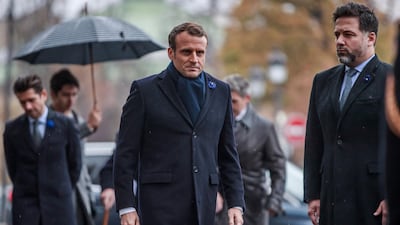Emmanuel Macron took the salute at the annual Armistice commemoration in Paris on Monday and looked forward to three hectic days of diplomacy as world leaders gather in Paris for the president’s signature Peace Forum initiative.
The backdrop to the summit was as overcast as the incessant rain over Paris after President Macron found himself at odds with the rest of Europe after he jibed that Nato was “braindead”.
Framed by aides as an effort to inject new purpose into the 29-member alliance, the intervention by Mr Macron has invited pushback, led the Germans and Poles, against the appearance of division. Russia called the remarks "golden".
The French president has sought to reinvigorate the country’s global role with the Paris Forum. In its second year has attracted more than 6,000 delegates to discuss the biggest issues facing diplomats.
The Forum got underway on Monday with discussions between Mr Macron and Antonio Guterres, the UN Secretary General. Visiting heads of state and government ministers will discuss the implications of technological innovation, cybersecurity, environmental challenges and cultural dialogue.
The panel Art of Dialogue, Dialogue of the Arts on Tuesday will feature Noura Al Kaabi, the minister of Culture and Knowledge Development.
The scope of the discussion testifies to the broad sweep of Mr Macron’s foreign policy vision. However, the president has come under fire for his handling of long-standing alliances when strengthening European defence is vital as the US has shifted to “America First”.
Having commented that President Donald Trump was “turning its back” on Europe, Mr Macron added he did not know if the Article Five mutual defence clause of the Nato treaty could be relied on in future.
Mr Macron also pointed to the recent shock to the system from Turkey’s offensive in Syria. This action exposed the complete lack of co-ordination between the US and its allies. “None,” he said. “You have an uncoordinated aggressive action by another Nato ally, Turkey, in an area where our interests are at stake. There has been no Nato planning, nor any coordination. There hasn’t even been any Nato deconfliction [between allies].”
Amid the fallout from the remarks, Warsaw asked Paris to renew its security commitments to its European allies for whom Nato is the primary guarantor of security.
“President Macron is in a different position because he does not feel the hot breath of the Russian bear on his neck,” said Mateusz Morawiecki, the Polish prime minister.
The comments dominated Monday’s meeting of foreign ministers in Brussels. Ministers lined up to stress Nato was indispensable and the main place for security cooperation in Europe.
“The more he presents this vision as a substitute rather than as being complementary to Nato, the less he is likely to persuade countries such as Poland or Romania – to name but a few – to go along with his plans,” wrote Jonathan Eyal, director of the Royal United Services Institute (Rusi).
Francois Heisbourg, a former French official, said Mr Macron was speaking into a vacuum, setting out an analysis that would be more appropriate from strategic studies experts. “Macron is speaking like a policy-detached think-tanker. That is bizarre and dangerous, given the very real risks attached to any suggestion that article 5 may not be operative,” he said.

